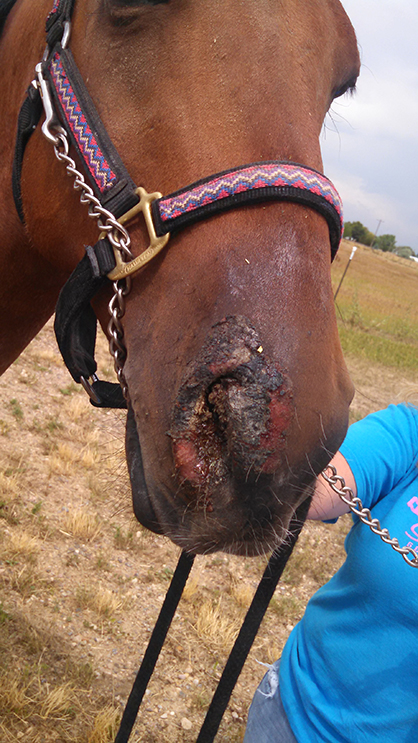Get the 411 on EHV-1 and Vesicular Stomatitis
By: Megan Arszman
With the influx of frightening contagious diseases infiltrating the show circuit so early into the season, it’s important to know how to manage the threat and keep your horse safe.
EHV-1
What is it? Equine Herpesvirus-1 is a highly contagious virus that causes a variety of ailments from abortion in broodmares to rhinopneumonitis (a respiratory disease in foals). Horses afflicted by the disease typically look normal for a few days before signs start popping up. Clinical signs of the viral disease include a fever, decreased appetite, nasal discharge, depression, and a cough. Neurologic signs such as incoordination, weakness or paralysis of the fore- and/or hind limbs, loss of tail tone, and the inability to rise can appear with the neurologic form.
Transmission: The most significant form of transmission of EHV-1 is horse-to-horse contact, as well as horses coming into contact with items such as surfaces, grooming supplies, tack, trailers, or gates that have been touched by an infected horse. The virus can be spread through the air, but only over short distances (unlike equine influenza). Therefore, separation of exposed and unexposed horses of at least a hundred yards can stop transmission.
Prevention: So far, there is no vaccine that has been proven to prevent EHV-1. However, some more potent vaccines can reduce the shedding of the virus. General biosecurity rules include keeping infected horses at least 100 yards from unaffected horses, washing hands after handling infected horses, and using separate tack and tools for each animal. Keep up to date on the latest outbreak announcements and work with your veterinarian to follow protocol to keep your horse healthy.
Vesciular Stomatitis
What is it? Vesicular stomatitis is a viral disease that’s more commonly found in the southwestern United States, affecting mostly horses, cattle, and swine. It’s identified by the formation of lesions (blisters) typically found on the tongue, lips, and around the mouth or nose. The blisters can also be found on the udder or sheath or along the coronary band. The lesions look very painful, but experts do not see long-term effects very often. Other signs that your horse might be affected by the virus include excessive slobbering and a fever of 102-104°F in the acute phase of the disease.
Transmission: Vesicular stomatitis resides in the blisters and on the skin surface after the blisters rupture. There are only a few different ways that VS can be transmitted from horse to horse. The most difficult way to prevent transmission is via vectors such as biting flies—black flies, sand flies, and Culicoides (biting midges). Horse-to-horse transmission can occur when another horse comes into contact with an infected horse’s open lesions. The third way is if your horse comes into contact with contaminated equipment such as shared water troughs, feed buckets, or surfaces like grooming and tie areas.
Prevention: Proper biosecurity protocols, such as disinfecting water troughs, feed buckets, and walls regularly and quarantining infected horses, will help prevent transmission. When you’ve handled a horse infected with VS, wear gloves and be sure to wash your hands with soap and water. Keep a change of clothes at the barn as well.
Practice good insect control during outbreaks by using flysheets, masks, and sprays. Using fly predators, which are insects that feed on other insects, is inexpensive and helps control the fly population on your farm.
Is your horse at risk for these or other contagious diseases? Check out Equine Guelph’s handy online tool for calculating biosecurity risk on your farm by clicking here.











